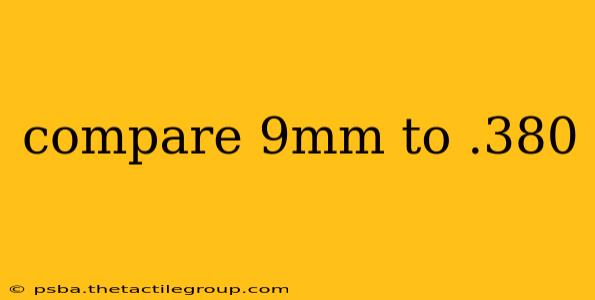Choosing the right handgun cartridge is a crucial decision, especially for self-defense or target practice. The 9mm Parabellum and the .380 ACP (Automatic Colt Pistol) are popular choices, but they offer distinct advantages and disadvantages. This comparison delves into the key differences to help you make an informed decision.
Caliber, Size, and Recoil
The fundamental difference lies in caliber: 9mm is larger than .380 ACP. This directly impacts several aspects:
-
Bullet Size and Energy: The 9mm round boasts significantly more stopping power due to its larger bullet and higher muzzle energy. This translates to a greater potential for incapacitating a threat. The .380 ACP, while effective at close range, offers less stopping power.
-
Recoil: The larger 9mm round produces more recoil than the .380 ACP. This can be a significant factor for smaller shooters or those new to firearms. The reduced recoil of the .380 makes it easier to handle and control, leading to faster follow-up shots.
-
Magazine Capacity: Generally, 9mm handguns offer higher magazine capacities than .380 ACP pistols, providing more rounds before needing a reload. This is a critical advantage in a self-defense situation.
Accuracy and Range
While both calibers are suitable for self-defense and target shooting, there are subtle differences:
-
Accuracy: Both cartridges are capable of good accuracy at typical self-defense ranges. However, the 9mm's higher velocity and flatter trajectory can offer a slight edge at longer distances.
-
Effective Range: The 9mm generally has a longer effective range than the .380 ACP due to its higher velocity and energy retention.
Penetration and Expansion
-
Penetration: 9mm rounds, particularly those with full metal jacket bullets, tend to penetrate deeper than .380 ACP rounds. This is crucial to consider in situations where you may need to penetrate barriers such as clothing or car doors.
-
Expansion: The expansion of a bullet (its ability to mushroom upon impact) impacts its wounding potential. Both calibers offer expanding ammunition options, but the larger 9mm projectile often expands more reliably, resulting in greater wound cavitation.
Availability and Cost
-
Ammunition Availability: 9mm ammunition is widely available and typically less expensive than .380 ACP ammunition. This is a significant factor for regular practice and training.
-
Handgun Availability: Both calibers have a wide range of handguns available, catering to various budgets and preferences. However, the 9mm generally has a broader selection of models and manufacturers.
Which Caliber is Right for You?
The best choice between 9mm and .380 ACP depends on individual needs and preferences:
-
9mm: The preferred choice for most self-defense situations due to its higher stopping power, greater capacity, and wider ammunition availability. It’s also a popular choice for target shooting and competitive events. However, the increased recoil might be a drawback for some shooters.
-
.380 ACP: An excellent option for concealed carry, especially for individuals seeking a less powerful, easier-to-control cartridge. Its smaller size and lighter recoil make it ideal for smaller-framed individuals or those new to firearms. However, its reduced stopping power should be carefully considered.
Ultimately, the decision hinges on personal factors such as experience level, physical capabilities, intended use (self-defense, target shooting, or both), and comfort level with recoil. It's always recommended to handle and fire both calibers (under proper supervision at a shooting range) before making a final decision. Remember to consult with a firearms expert for personalized advice.

